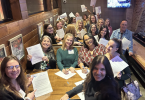Editor’s Note: To commemorate PRSA Ethics Month, PRSAY is running a month-long series of posts on important issues facing the public relations profession. This is the first post in the series. An archive of ethics-related posts can be found here.
An interesting situation bubbled up in the Wall Street Journal over the summer regarding an intern and her fabrication of content for an article she was assigned to write.
In a nutshell, she made a lot of stuff up…she got caught…she got fired.
Case closed?
As a public relations professional now teaching the next generation(s) of practitioners, my response is, “No and no.”
I see three “responsible,” if that’s the best way to describe it, parties.
First, though…internships are serious business.
I say this, again, as a PR practitioner/educator. I supervise an average of 6-to-8 interns in the course of a semester at Curry College.
Part of my role as Faculty Advisor is to meet regularly with the intern to monitor his/her progress and get direct feedback from the intern’s perspective, on how the internship is going. I dig specifically for job responsibilities, learning opportunities, and Site Supervisor guidance.
In addition, I check in with the Intern’s Site Supervisor at least once or twice during the semester for the same things…how the intern is doing, problems (if any), concerns, etc.
What I’m looking for in this activity are (a) the learning aspect of the internship and (b) the hands-on supervision and instruction that the intern is getting.
Back to the “three parties.”
First, let’s look at the intern’s supervisor at the Wall Street Journal. Where was he or she in this process? Was the intern made aware of the Code of Ethics of the Society of Professional Journalists in which is clearly stated as a primary guideline, “Seek Truth and Report It”?
Simple enough…and this caution is followed by a comprehensive listing of acts that comprise ethical journalism from the SPJ’s point of view.
PRSA similarly has a comprehensive description of ethics for the public relations professional. First and foremost on its list of guidelines is this: “Protect and advance the free flow of accurate and truthful information.”
Regardless of which side of the fence you’re sitting…PR professional or journalist…it’s clear that “truth” plays a huge role in your responsibilities.
What guidance did the supervisor give the intern?
Second come the intern’s professors in college. Whether they were journalism or public relations, the mantra should have been similar: “Ethical conduct is vital for the maintenance of trust and goodwill of our audiences.”
My own students hear this from me constantly… “You are the public face of your employer. How you conduct yourself in the course of your work reflects, first, on you as the representative of your employer, and, second, on you as a professional.”
I usually add… “and if you do cheat or bend the rules in some way, I can assure you…you will be caught.”
Finally…the intern. Did she not bother to read anything in the course of her journalistic studies about ethics?
Not only do the textbooks discuss ethics…again either journalism or public relations…in detail. It’s stressed…again and again…in class after class after class.
Does she think someone else is going to clean up behind her…or not actually read what she’s writing? (Note: Whenever I get a paper from a student in which the quality of writing “just doesn’t match” that particular student, I do a simple Google search with a couple of phrases to see what pops up. Once got an entire…complete with the reporter’s own grammatical errors…article from a newspaper for a paper assigned as a “personal reflection.” BUSTED!!)
It’s all about responsibility, something I address frequently in my own blog…among other things that students…and professionals should think about…seriously.
What we should have learned here, to paraphrase my South Park idols, is that ethics is your responsibility, but it is incumbent on all of us to ensure that the message is communicated, acknowledged, and understood.
“Ethics is a code of values which guide our choices and actions and determine the purpose and course of our lives.” — Ayn Rand (1905-1982)






